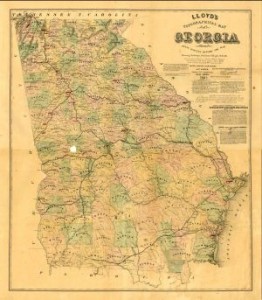 In the Baptist churches of the Confederacy, most of which are integrated, tensions between white and black members have steadily grown as the war drags on. For enslaved African Baptists, the church house is the one place where, at least in theory, a semblance of equality of the races is partially realized. This relative degree of equality is within the spiritual realm, for the Baptist faith, opposed to hierarchical structures among believers, focuses on the priesthood of all believers. As such, white and black individuals alike stand as equals before Christ.
In the Baptist churches of the Confederacy, most of which are integrated, tensions between white and black members have steadily grown as the war drags on. For enslaved African Baptists, the church house is the one place where, at least in theory, a semblance of equality of the races is partially realized. This relative degree of equality is within the spiritual realm, for the Baptist faith, opposed to hierarchical structures among believers, focuses on the priesthood of all believers. As such, white and black individuals alike stand as equals before Christ.
In practice, however, blacks are limited in the roles they are allowed to assume in Baptist life. In matters of discipline, white church leaders decide the fate of blacks accused of sins, while blacks are not allowed to vote in matters relating to discipline of white members. In addition, before the war, blacks men sometimes — if rarely — are allowed to preach, for example.
Now, rising white fear of black insurrection has made the racial equation in Baptist churches all the more complex. Fear among white members empowers black members to a degree greater than prior to the war. At the same time, the same fear leads to a cautious restricting of privileges granted to blacks in earlier years.
Today, the Van Wert Baptist Church in Paulding County, Georgia, meeting in the monthly business session, makes a decision reflective of the fear-caused tension among whites and blacks within the congregation.
Conference opened as usual. A colored Brother, Moses, applied through Brother Heaton for permission to preach in this house, when, on motion, her consent was withheld. A Letter of Dismission was granted to Mary, the property formerly of Mr. Stocks. R. W. Hambrick, Moderator John A. Rentz, Church Clerk
Denying one black member’s request to preach a sermon, the church on the other hand grants the wish of another black member to peaceably leave the congregation (presumably in order to transfer her membership to another Baptist church). Whether or not either or both of these individuals are slaves is uncertain, but the give and take characteristic of race relations is evident in the plain written records of today’s church business meeting.
Sources: Minutes, Van Wert Baptist Church, 1860-1870 (link); see also Bruce T. Gourley, Diverging Loyalties: Baptists in Middle Georgia During the Civil War, Macon, Ga.: Mercer University Press, 2011 (link)


